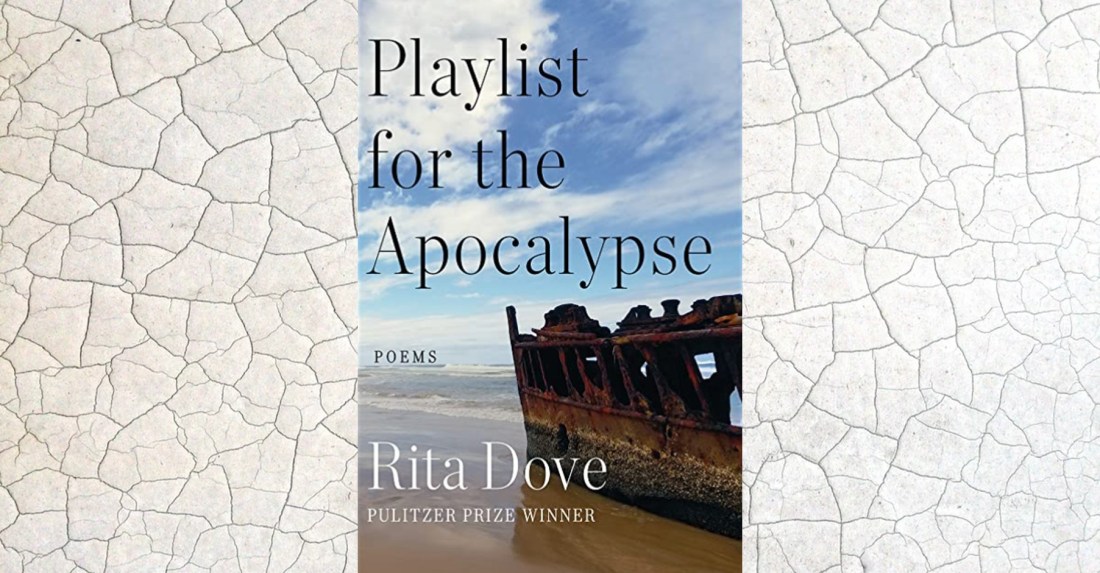Rita Dove has long been one of my favorite poets. In college, where I first encountered her work, I enjoyed the imagery and accessibility of her poems. She had an eye for detail, and as a haphazard reader of poetry at the time, I used that detail as a way into the poem. When I had children, one of her poems about maternal ambivalence, “Daystar,” moved me deeply. I still recall the lines:
And just what was mother doing
out back with the field mice? Why,
building a palace.
Dove is a former U.S. Poet Laureate and a recipient of the Pulitzer Prize in 1987 for her book, Thomas and Beulah. Currently, she is the Henry Hoyns Professor of Creative Writing at the University of Virginia. Her eleventh collection of poetry, Playlist for the Apocalypse, feels both intricate and monumental at the same time. She continues to be what she always was: a master of blending the individual and the collective, the personal and the political.
The collection is divided into six sections, including a series of poems that reflect on the evolution of the word “ghetto,” which was first used in sixteenth-century Venice; a group of poems from the point of view of a spring cricket; and a set of “angry odes.” One section, titled “A Standing Witness,” consists of several “testimonies” in the voice of a female witness to American historical events during the past fifty years, including Watergate, Roe v. Wade, the AIDS epidemic, 9/11, and the administrations of both Barack Obama and Donald Trump.
History is indeed a significant touchpoint or thread throughout the entire book, but some of that history is quite recent. “Keep Your Storied Pomp,” for instance, is about the rise of neofascism in America:
Welcome to the Age of Babble!
Here a twitter, there a tweet; a tiki torch march
back to the Good Ole Times of mayhem and murder,
hollow-points blossoming all over!
Everywhere a body bloody;
even the earth is bleeding out.
The poems in the final section of the book, titled “Little Book of Woe,” turn away from the overtly political and move toward the profoundly personal. They pertain to the poet’s Relapsing-Remitting Multiple Sclerosis and its debilitating effects on her body — her pain, her inability to move as she would wish, and thoughts of her own mortality. In “Soup” the poet would rather think of her dinner than the doctor giving her a diagnosis:
Yes, soup was what I wanted: not news
but the slow courage of the lentil
as it softened, its heart splitting into wings…
But Dove is not solely occupied with social injustice and disease in Playlist for the Apocalypse: many of the poems in this playlist are also playful. There is the musical “Hip Hop Cricket” and the witty and alliterative “Ode to my Right Knee.” Both are a joy to read aloud.
Sprinkled throughout the book, too, are language and imagery that surprise. In “Lucille, Post-Operative Years” Lucille’s disappointment in her inability to think clearly is “palpable as bread.” In “From the Sidelines” a man’s gaze at a woman is “either a kiss or a slap or the whiplash of pure disregard.”
“Climacteric” is one of my favorite poems in the entire collection, perhaps because I relate so well to it. In it the narrator takes advantage of a “sun-filled, vacant” day to write after her friends have left her to her own devices, and she refuses to regret it:
If loving every minute spent jostling syllables while out in the world others slog through their messes implies such shuttered industry is selfish or irresponsible, then I’m the one who’s fled. Ta-ta! I’m not ashamed; Each word caught is a pawned memory, humbly reclaimed.
I’m grateful that Dove jostled syllables and caught words for this latest collection, because Playlist for the Apocalypse is everything I’d want from her and more.
Playlist for the Apocalypse
By Rita Dove
W.W. Norton & Company
Published August 17, 2021


